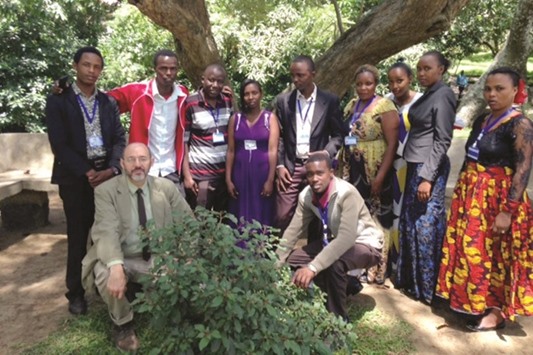You know literacy and education around the world has a bright future when you see students and schools coming forward to help other schools in economically backward communities. The American School of Doha (ASD) supports numerous such adopted school projects around the world.
These projects are aimed at both providing opportunities for ASD students and teachers to become positive, active, global citizens and supporting education and gender equality in the countries which host these projects. One of the ASD’s most extensive projects is at the St Pius School in Arusha, Tanzania. Being a part of one of the ASD’s learning service trips, it allows ASD students to assist in the expansion of the school, building new classrooms, and leading learning enrichment activities such as arts and crafts, sports and music.
ASD students and staff have also taken an active role in providing opportunities for teacher development and continuing education at St Pius. For the second year running, the ASD Parent Teacher Association (PTA) fully funded the cost of sending an ASD teacher to provide teacher in-servicing at St Pius as one of their charitable initiatives.
Dr Timothy Coble returned to Arusha recently to continue providing training in gender-based differentiation. It aligns very closely with the St Pius School’s goal of furthering the education of girls in the region and improving the quality of education in general.
“The teachers of St Pius are highly professional. Although a private school, they take great care to create a curriculum and school environment that the government of Tanzania can accredit,” Dr Coble tells Community. “St Pius Nursery and Primary school is a happy destination for the children who attend there and one of hope for the families of the neighbourhood,” says Dr Coble. It is hoped that this endeavour will continue well into the future as it was very well received by the St Pius staff on both occasions.
ASD students have also started a scholarship programme for members of the St Pius community, whether it be teachers, alumni or residents in the area to allow them to further or continue their education beyond the secondary level, one of the glass ceilings in educational development.
ASD senior student Sara Lowe took the lead in this initiative and has been working to fundraise to allow one of the St Pius School teachers, Adelina Alex (Adela), to continue her education at the university level. Due to a combination of low wages and a high cost of living, tertiary education is beyond the reach of most students as access to loans and other similar support is very limited, as was discovered by Lowe when she started working with Adela to research options. “Another important issue in developing nations is secondary and higher education. When I went on a service trip to Tanzania in my junior year, I met a teacher named Adela at St Pius. I won’t ever forget my first conversation with her, she told me about how she had received some limited education and was able to get her teaching certificate, but she couldn’t afford to get her degree,” Lowe tells Community.
“She wanted more than anything to go to college so that she could be a real teacher, but she knew that she wouldn’t be able to pay for it. Adela is the most ambitious woman I have ever met.
When I got home from Tanzania, Mr Shang (ASD’s CAS Co-ordinator) and I figured out how much it would take to send her to university in Arusha,” she recalls.
Since then, Sara says, they have been able to collect half of what they need to send Adela to school for five years. “I am so beyond grateful to know Adela and to those who have worked to empower her through a college education, and I can’t wait to see her succeed,” says Sara.
Currently, different student service groups at ASD including Girl Up!, the Global Issues Club and a number of IB CAS Projects are collaborating to help fully fund Adela’s university tuition. The focus on education is key to many of the ASD’s overseas service projects as it is their hallmark to help empower communities to become self-sustaining. The ASD also aligns all of its learning service opportunities to at least one of the United Nations Sustainable Development Goals (SDGs), with Quality Education, being one that is heavily emphasised.

ON THE GROUND: Dr Timothy Coble, left, with volunteers and team members at St Pius in, Arusha, Tanzania.
